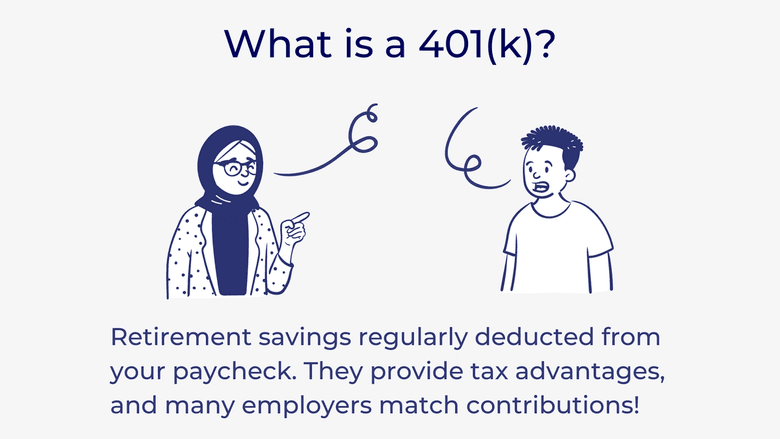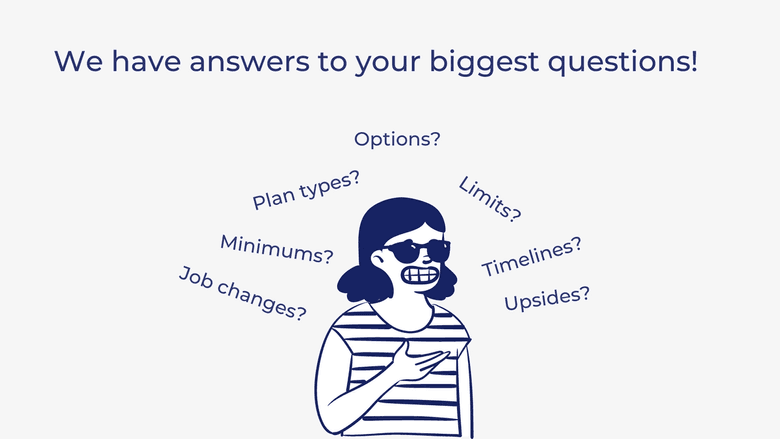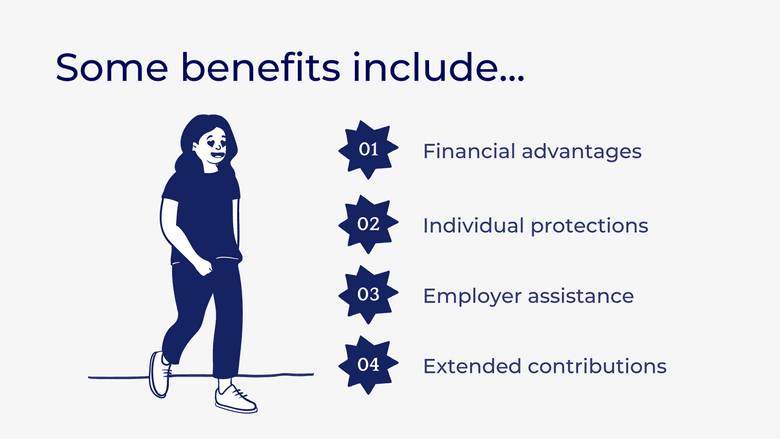8 Key Benefits of 401(k)s
401(k)s can be a powerful tool for building wealth. Learn how you can benefit from financial advantages, individual protections, and even employer matching.
No matter how old you are, it’s never a bad idea to start planning for retirement. One way to start your retirement savings plan is with a 401(k), the most popular employer-sponsored retirement plan in the country.
Named for the section in the U.S. Internal Revenue Code (IRC), a 401(k) is a tax-advantaged, defined-contribution retirement plan offered to many workers by their employer. Unlike a traditional pension, a 401(k) savings plan puts the responsibility for saving for retirement on each employee.
With social security unlikely to continue functioning in the same way for future retirees, it’s a good idea to start saving now, and a 401(k) is a simple way to start.
How 401(k)s Work

The Basics
When an employer offers its workers a 401(k), employees can opt to contribute a certain percentage of their income to that plan. The contributions will automatically be deducted from an employee’s paycheck, and can be written off each year on taxes.
Some employers will offer matching contributions, or an employer match, where they will match the amount you contribute to your 401(k) plan. They also have the option of adding a profit-sharing feature, which contributes a part of the company profits to the plan as well. Some companies will match at 50% of your earnings, while some might even match dollar for dollar what you put into your 401(k). The investment earnings of your 401(k) will not be taxed until you withdraw that money, usually after retirement.
While 401(k)s are most commonly offered to full-time employees at larger companies, more and more people, including part-timers and those who work for small businesses, are able to access 401(k) accounts.
Plan Types
There are two types of 401(k)s that you can use: traditional 401(k)s and Roth 401(k)s. Under a Roth 401(k), much like under the Roth IRA, withdrawals are fully tax-free.
Employees who expect to be in a lower marginal tax bracket when they retire will usually want to use a traditional 401(k) to take advantage of the immediate tax break. However, higher earners who want to avoid taxes later can utilize Roth 401(k)s.
Some employees will spread out their money over two accounts - one traditional 401(k) and one Roth 401(k). That way they can maximize their earnings. You can make penalty-free withdrawals with a Roth 401(k) after you’ve had it for over five years.
401(k) FAQ

What are my investment options?
401(k)s generally offer a wide variety of investment options for you to choose from, including but not limited to money market funds, stable value accounts, bond mutual funds, stock mutual funds, or your own company’s stock. Each type of investment comes with its own risk, and you should discuss options with your financial advisor.
What is a defined-contribution plan?
In a defined-contribution plan, there are both employee contributions and employer contributions to the retirement account. They can each contribute up to the dollar limits set by the Internal Revenue Service (IRS).
What are the contribution limits?
The maximum contribution limits are set according to inflation; as of 2020, the basic limits on employee contributions are $19,500 per year for workers under 50, and $26,000 per year for workers over 50.
If your company utilizes employer match to contribute to the retirement account as well, the limit goes up to $57,000 and $63,500 dollars respectively.
When can I withdraw money?
It is difficult to withdraw money from a 401(k) before you reach retirement age, and it should not be where you put all of your savings. When you withdraw the money from a traditional 401(k), it will be taxed as ordinary income. However, you must be at least 59 and a half, or meet other criteria such as disability, to withdraw money without a penalty.
The penalty for others withdrawing money from their 401(k) is usually a 10% early distribution penalty tax.
What is the required minimum distribution?
Unless you are still employed with the same company, you must withdraw a specific portion of your retirement income starting at age 72.
What if I leave my job?
There are multiple options available: you can withdraw the money, which is not advised unless you need the money immediately, or you can utilize a rollover to move your money to an IRA (investment retirement account). Some employers will allow you to retain the 401(k) account with them, or you can move it to your new employer.
401(k) Benefits

Financial advantages
Tax advantages: With a 401(k), you make contributions on a pre-tax basis, so you can deduct your contributions in the year you made them. Because your 401(k) contributions are taken out of your paycheck before payroll deductions, you will pay less in income taxes each year. As your 401(k) grows over time, you also do not pay taxes on the money there until you withdraw it at retirement age, where you might be in a lower tax bracket. This means 401(k) money can grow much faster than money in individually owned stocks or mutual funds, creating even more tax benefits.
Emergency benefits: If you require an emergency loan, some plan sponsors will allow you to withdraw from your 401(k) without incurring the early withdrawal penalty. You will have to pay the money back with interest.
Individual protection
Shelter from Creditors: 401(k)s are set up under the Employee Retirement Income Security Act (ERISA), and ERISA accounts are protected from judgment creditors. 401(k)s also offer protection from federal tax liens, or government claims against the assets of a taxpayer with unpaid back taxes.
Fiduciary Benefits: Because 401(k) plans fall under ERISA standards, employers must make sure that plan participants’ interests are put first, and the employer is held to a fiduciary standard. This means that costs must remain reasonable, investment options must be stable, and key information like fees must be disclosed to plan participants.
Employer assistance
Automatic enrollment: Most companies will automatically enroll new hires in 401(k)s, making it very convenient for you to start saving. And because your 401(k) employee contributions are deducted automatically from your paycheck, you are forced to save a set amount of money.
Employer matching: If your company offers employer matching contributions, then you can make free money just by setting aside a certain amount of your paycheck each month.
Extended contributions
401(k) Contributions After 72: With some retirement plans, once you reach retirement age, you cannot keep contributing to your account. However, using a 401(k), you can contribute as long as you are still working and you are not required to accept mandatory distributions from your plan while still employed.
Late Saver Benefits: If you didn’t start saving for retirement until later in your career, then you can utilize catch-up contributions. As of 2020, the government allows catch-up contributions of $6,500 per year on top of the usual contribution limit.
If you have more questions, you can always reach out to a financial advisor to make sure you’re utilizing the plan to the best of your ability. 401(k) plans change each year due to contribution limits, tax advantages, and your own financial situation, so it’s a good idea to review your plan to maximize your retirement savings. Your personal finance is your responsibility, and a 401(k) will help you secure your future.
The information provided herein is for general informational purposes only and is not intended to provide tax, legal, or investment advice and should not be construed as an offer to sell, a solicitation of an offer to buy, or a recommendation of any security by Candor, its employees and affiliates, or any third-party. Any expressions of opinion or assumptions are for illustrative purposes only and are subject to change without notice. Past performance is not a guarantee of future results and the opinions presented herein should not be viewed as an indicator of future performance. Investing in securities involves risk. Loss of principal is possible.
Third-party data has been obtained from sources we believe to be reliable; however, its accuracy, completeness, or reliability cannot be guaranteed. Candor does not receive compensation to promote or discuss any particular Company; however, Candor, its employees and affiliates, and/or its clients may hold positions in securities of the Companies discussed.
